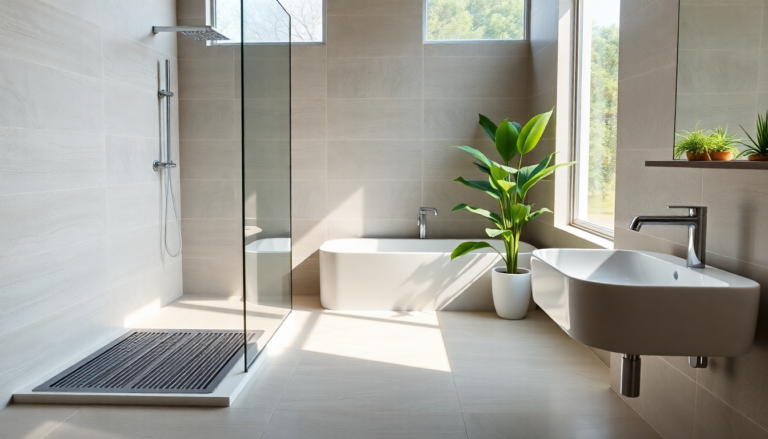Argomenti trattati
Transforming Your Bathroom: A Functional Sanctuary
Your bathroom is more than just a utilitarian space; it should be a calming retreat that enhances your daily routine. While fixtures like showers, sinks, and toilets may not inspire creativity, their condition can prompt a renovation. As you consider updates, it’s crucial to understand that the costs of remodeling a bathroom can vary significantly in 2025, influenced by factors such as location and the size of your space.
In metropolitan areas, renovation expenses typically soar due to the higher cost of living, making budgeting even more critical. A bathroom remodel is a long-term investment, so every dollar spent should be accounted for wisely.
Key Steps Before Starting Your Renovation
Before diving into renovation plans, Scott McGillivray, a seasoned home renovation expert, recommends living in the space for a while. This allows you to assess the layout and identify necessary changes without making impulsive decisions. McGillivray emphasizes that many DIY renovations fail due to hasty gutting of the space, often when it isn’t necessary. If living in the space isn’t an option, consulting a professional designer can provide valuable insights into effective space planning.
According to interior designer Jessica Helgerson, hiring a specialist can eliminate guesswork and ensure a functional design tailored to your needs. Regardless of the renovation’s scope, establishing a budget and understanding the variable costs is essential.
Average Costs of Bathroom Renovations in 2025
Estimating bathroom renovation costs can be challenging due to the wide variety of materials and sizes. As a general benchmark, the average national cost for a bathroom renovation in 2025 is approximately $12,119. However, this range can vary significantly, from about $6,639 to $17,621, depending on factors like the type of bathroom being remodeled.
For instance, renovating a primary bathroom typically incurs higher costs, often exceeding $32,000, especially when luxury materials are involved. Understanding the type of bathroom you’re working with can help narrow down your budget expectations.
Budgeting for Fixtures and Materials
When planning your renovation, consider the various categories of expenses, particularly plumbing fixtures, which can significantly affect your overall budget. The range of options, from standard fixtures to custom designs, means you’ll need to make thoughtful choices to stay within budget.
- Faucets and Showerheads: Costs can vary greatly based on style and brand.
- Sinks: Choose between drop-in or undermount sinks based on your vanity type.
- Toilets: Standard two-piece toilets are cost-effective, while luxury options can be pricier.
Remember that the bathroom’s layout can influence fixture choices. A primary bathroom will often feature both a shower and tub, while half baths may just include a toilet and sink. Understanding these distinctions will help you allocate your budget more effectively.
Flooring and Tiling Costs
Flooring can make a significant impact on your bathroom’s overall appearance and functionality. Tile and stone are popular choices due to their durability, while hardwood may warp in humid conditions. If radiant heating is desired, factor in an additional $7 to $15 per square foot.
Additionally, tile installation costs typically range from $0.60 to $4 per square foot, depending on the material. Investing in professional tile installation is advisable, especially for intricate designs. Your choices here will not only affect your budget but also the aesthetic appeal of your renovation.
Professional Help vs. DIY
Deciding between DIY and hiring professionals can significantly impact your renovation budget. While undertaking some tasks yourself can save money, it may also lead to costly mistakes if you lack experience. Common tasks like painting or replacing fixtures might be manageable, but plumbing and electrical work are best left to professionals.
If you choose the DIY route, be prepared for a longer timeline, as it often takes longer without a dedicated team. Alternatively, managing a team as a general contractor can provide a balance, allowing you to oversee the renovation without executing all the labor yourself.
Understanding Permits and Unforeseen Costs
Before starting, ensure you understand local permit requirements, which can range from $175 to $2,000. This cost is usually a percentage of your total renovation budget, especially for extensive projects. A general contractor can typically handle these requirements for you.
Be prepared for unforeseen repairs, such as mold removal or plumbing fixes, which can derail your project timeline and budget. Allocating a buffer in your budget for unexpected issues is crucial to ensure a smooth renovation process.
Maximizing Return on Investment
A bathroom renovation can yield a significant return on investment, with midrange renovations averaging a 56.2% ROI. If you prioritize accessibility features, the ROI can rise to 70.6%. Keeping the existing layout can help minimize expenses, as moving plumbing and electrical systems typically incurs the highest costs.
In 2025, the average cost of installing a walk-in shower ranges from $4,200 to $8,500, influenced heavily by the chosen materials and finishes. Understanding the expenses associated with each element of your renovation will help you plan effectively and achieve the bathroom of your dreams.

